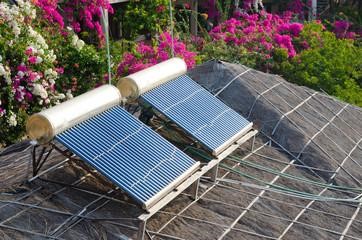Solar Water Heater Miami – Frequently Asked Questions
Solar Water Heater Miami – Frequently Asked Questions
Solar pool water heating is a technology that each homeowner can use to save dollars on utility bills. Questions most frequently addressed to the Florida Solar Energy Center (FSEC) concerning solar water heating are answered below. Please note that many replies are general and more explanation may be required for those with particular questions.
What is a Solar Water Heater?

A solar pool heater uses the sun’s energy instead of electricity or gas to heat water, reducing your monthly utility bill. When installed correctly, solar water heaters for Miami are more economical over the life of the system as compared to heating water with electricity, dedicated heat pumps, heat recovery units, or propane.
In Miami, three types of solar systems are used: pumped, integral collector storage (ICS), and thermo-siphon. The direct circulation system circulates potable water from the water storage tank throughout one or more collectors and back into the tank. The solar collector is a significant component of the solar system. It is usually a metal box with insulation and a black absorber plate that amasses solar radiation and heats the water. The circulating pump is controlled by either an electronic controller, a common appliance timer, or a photovoltaic (PV) panel.
In integral collector storage systems, the solar water storage system is built into the collector. The potable water in the collector unit is heated by the sun and delivered by municipal or well water pressure to an auxiliary tank (which contains non-solar backup heating) or directly to the point of usage.
A thermosiphon solar water heating system has a tank mounted above the collector (usually on the roof) to provide natural gravity flow of water. Hot water rises through piping in the collector, which is mounted below the tank; heftier cold-water sinks to the lowest point in the system (the collector), displacing the lighter hot water, which rises to the tank.
The ICS and thermosiphon systems are simple because they use no pumps or controllers, and water always flows through the collector.
Do I Have to Change My Habits to Use a Solar Water Heater Miami?
No. Solar water heaters are typically installed with a backup heating system in the storage tank to ensure that hot water is available at all times. Nevertheless, to maximize solar utilization and your savings, you should attempt to use the warmest water in the late morning and early afternoon when the solar system is operating at its peak due to the available sunshine. Your solar system will be more effective if your use of hot water is spread more evenly over the week. For instance, if you use hot water for laundry, instead of washing sevral loads of clothes every day, wash one load each day. This will reduce the amount of backup energy needed for your solar system.
How Much Does a Solar Water Heater Miami Cost?

In Miami, an installed solar water heating system can cost anywhere from $3,500 to $5,500. Why the vast range? System cost depends upon particular variables, such as the following:
- Size of the household to be served
- Size and kind of solar system
- Type of financing existing
- Kind of roof on which the collector is to be installed
- Amount of possible utility reimbursement incentive
- Building code needs
- Expert versus do-it-yourself installation.
Solar water heater Miami is economically competitive with electrical and propane heaters. It is also competing with dedicated pool heat pumps and heat recovery units, based on the individual situation.
How Do I Finance a Solar Water Heating System?
The best way to finance a solar energy system is to include it as part of your household mortgage. In long-term loans of 20 years or more, the monthly solar savings are generally greater than the monthly mortgage payments for the solar system.
If you are purchasing an existing home with a new mortgage, you may be able to include a new solar water heater in the mortgage. Check with your resident lending office. Many Florida lending institutions offer short-term loans for solar systems, depending on the applicant’s personal credit rating. Some solar corporations also provide system financing.
